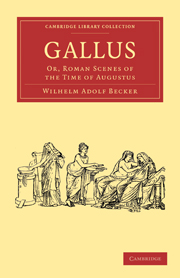Book contents
- Frontmatter
- Translator's Preface
- Author's Preface
- Contents
- ERRATUM
- SCENE THE FIRST THE NOCTURNAL RETURN HOME
- SCENE THE SECOND THE MORNING
- SCENE THE THIRD STUDIES AND LETTERS
- SCENE THE FOURTH THE JOURNEY
- SCENE THE FIFTH THE VILLA
- SCENE THE SIXTH LYCORIS
- SCENE THE SEVENTH A DAY AT BAIÆ
- SCENE THE EIGHTH THE DISPLEASURE OF AUGUSTUS
- SCENE THE NINTH THE BANQUET
- SCENE THE TENTH THE DRINKERS
- SCENE THE ELEVENTH THE CATASTROPHE
- SCENE THE TWELFTH THE GRAVE
- APPENDIX
- Excursus I Roman Marriage
- Excursus II Education
- Excursus I The Roman House
- Excursus II The Slave Family
- Excursus I The Library
- Excursus II The Books
- Excursus III The Booksellers
- Excursus IV The Letter
- Excursus V The Clocks and Divisions of Time
- Excursus I The Lectica and the Carriages
- Excursus II The Inns
- Excursus I The Game of Ball, and other Gymnastic Exercises
- Excursus II The Gardens
- Excursus: The Dress of the Women
- Excursus: The Baths
- Excursus: The Male Attire
- Excursus I The Meals
- Excursus II The Triclinium
- Excursus III The Table Utensils
- Excursus IV The Drinks
- Excursus I The Manner of Lighting
- Excursus II The Garlands
- Excursus III The Social Games
- Excursus: The Manner of Closing the Doors
- Excursus: The Interment of the Dead
- Index
Excursus I - The Lectica and the Carriages
Published online by Cambridge University Press: 10 November 2010
- Frontmatter
- Translator's Preface
- Author's Preface
- Contents
- ERRATUM
- SCENE THE FIRST THE NOCTURNAL RETURN HOME
- SCENE THE SECOND THE MORNING
- SCENE THE THIRD STUDIES AND LETTERS
- SCENE THE FOURTH THE JOURNEY
- SCENE THE FIFTH THE VILLA
- SCENE THE SIXTH LYCORIS
- SCENE THE SEVENTH A DAY AT BAIÆ
- SCENE THE EIGHTH THE DISPLEASURE OF AUGUSTUS
- SCENE THE NINTH THE BANQUET
- SCENE THE TENTH THE DRINKERS
- SCENE THE ELEVENTH THE CATASTROPHE
- SCENE THE TWELFTH THE GRAVE
- APPENDIX
- Excursus I Roman Marriage
- Excursus II Education
- Excursus I The Roman House
- Excursus II The Slave Family
- Excursus I The Library
- Excursus II The Books
- Excursus III The Booksellers
- Excursus IV The Letter
- Excursus V The Clocks and Divisions of Time
- Excursus I The Lectica and the Carriages
- Excursus II The Inns
- Excursus I The Game of Ball, and other Gymnastic Exercises
- Excursus II The Gardens
- Excursus: The Dress of the Women
- Excursus: The Baths
- Excursus: The Male Attire
- Excursus I The Meals
- Excursus II The Triclinium
- Excursus III The Table Utensils
- Excursus IV The Drinks
- Excursus I The Manner of Lighting
- Excursus II The Garlands
- Excursus III The Social Games
- Excursus: The Manner of Closing the Doors
- Excursus: The Interment of the Dead
- Index
Summary
WITH the great love of comfort that distinguished the upper ranks of the Roman world in later times, we may easily imagine that sufficient provision was made for the means of locomotion, unaccompanied by any exertion on their own part. We should form a very erroneous conception if we fancied that the Romans did not possess, as well as the moderns, their travelling, state, and hackney equipages: on the contrary, the means of conveyance in their times, though not so regularly organized as our stage-coaches and omnibuses, nor so generally used by all classes, were even more numerous, and, to a certain extent, better calculated for the purpose they were intended to answer, although this was intimately connected with the (to us unknown) system of slaves, and also depended on conditions of climate.
These subjects have been often and circumstantially treated of, and but little of importance remains to be added, so that we shall rather seek to select and properly apply the most essential points of what has already been made known. The most important writings are: Schefferi, De re vehiculari veterum, lib. ii., in Poleni thes. t. v., to which is appended, De vehiculis antiquis diatribe; Beckmann, Beitr. z. Gesch. d. Erfind. i. 390; and Ginzrot, Die Wägen und Fahrwerke der Griechen und Römer und and. alt. Völk. 2 vols. 4; a work which has the advantage of being written by a connoisseur in these matters, though as a philologist he is by no means all we could wish.
- Type
- Chapter
- Information
- GallusOr, Roman Scenes of the Time of Augustus, pp. 257 - 266Publisher: Cambridge University PressPrint publication year: 2010First published in: 1844



